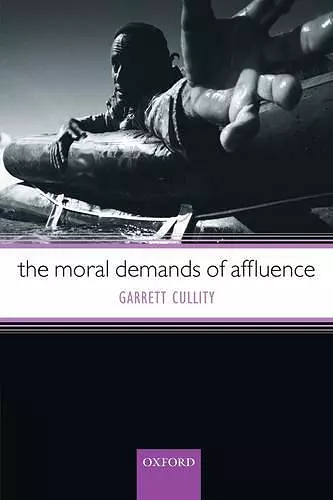The Moral Demands of Affluence
Format:Hardback
Publisher:Oxford University Press
Published:9th Sep '04
Currently unavailable, and unfortunately no date known when it will be back
This hardback is available in another edition too:
- Paperback£53.00(9780199204151)

How much are we morally required to do to help people who are much worse off than us? Philosophers have often raised this question in assessing the plausibility of particular moral theories. But it is a pressing question whatever one's moral outlook. Any plausible moral outlook should recognize requirements of beneficence - requirements grounded directly in other people's need for assistance. Given this, there is a forceful case for thinking that we are morally required - not only collectively, but also as individuals - to devote a substantial proportion of what we have to helping the poor. One way to present this case is by means of a simple analogy: an analogy between giving money to an aid agency and rescuing a needy person directly. Part I of Garrett Cullity's book examines this analogy in detail, discussing the ways in which it is politically and metaphysically simplistic. However, there remains an important truth in the simple analogy. It is that we are morally required to help. In one way, our world imposes a radical separation between its rich and poor inhabitants: our material circumstances are starkly different. In another way, however, it does not: the human experiences and fulfilments of rich and poor are fundamentally the same. This is an important part of the case for thinking that their welfare grounds requirements of beneficence on us to help them. But Part II shows that it is also part of the case for limiting those requirements. Drawing attention to the range of goods that ground requirements on us to help each other, Cullity argues that these requirements only make sense on the assumption that a life of a certain kind - a life that is not restricted in an extremely demanding way - is one that it is not wrong for us to live.
How much money and time does morality oblige the relatively affluent to devote to the relief of poverty, suffering, and other disadvantages? Anyone who finds this question remotely important should read Garrett Cullity's meticulous, even-handed treatment. The publication of this monograph signals the continuing emergence of a normative orientation that one might call "beneficence theory". . . . Many philosophers are attracted to the arguments which Cullity . . . dismantles. They will learn from him. By treating well-chosen opposing views so carefully and thoroughly, the book also rewards those who reject the author's ultimate conclusions. . . . the book offers something for nearly everyone. . . . the chapters are well-organized and clearly written. An advanced undergraduate with an ethics background should be able to follow them, and will gain a sophisticated overview of this vital area. * Notre Dame Philosophical Reviews *
Cullity has presented us with a thorough, detailed, and serious argument ... an important contribution to the discussion of this issue. * James R. Otteson, Journal of Value Inquiry *
- Winner of Winner of the Australian Catholic University Eureka Prize for Ethics 2008.
ISBN: 9780199258116
Dimensions: 241mm x 163mm x 22mm
Weight: 586g
296 pages